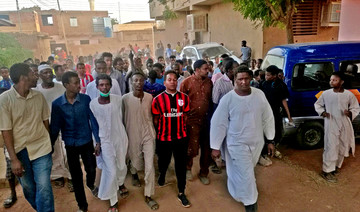KHARTOUM: Sudan on Thursday accused campaigners spearheading protests against President Omar Al-Bashir’s rule of threatening national security and advocating violence, as hundreds of demonstrators staged more rallies.
The country’s acting Information Minister Mamun Hassan warned of taking legal action against protest leaders after campaigners vowed to push on with their “uprising” against Bashir’s three-decade rule.
“It is confirmed what we always said that this... group is calling for violence,” Hassan said in a statement.
Protest campaigners on Wednesday held their first news conference at the offices of the main opposition National Umma Party since demonstrations erupted in December.
The Sudanese Professionals Association (SPA), which is leading the protests, and its allies called on other political groups to join their movement by signing a “Document for Freedom and Change.”
The text outlines a post-Bashir plan including rebuilding Sudan’s justice system and halting the African country’s dire economic decline, the key reason for nationwide demonstrations.
A senior representative of the National Umma Party, which has thrown its weight behind the protests, said at the event that it would continue the “uprising until this regime is overthrown.”
Party leader Sadiq Al-Mahdi, a former prime minister whose government was toppled by Bashir in an Islamist-backed coup in 1989, last month called for the president to step down.
Protests first erupted in Sudan on December 19 in the farming town of Atbara after a government decision to triple the price of bread.
They quickly escalated into near-daily demonstrations across cities and towns that analysts say pose the greatest challenge to Bashir since he took power.
Officials say 30 people have died in protest-related violence so far, while Human Rights Watch says at least 51 people have been killed.
The authorities led by the feared National Intelligence and Security Service (NISS) has launched a sweeping crackdown to quell the protests.
Rights groups say hundreds of protesters, opposition leaders, and activists have been arrested, while media watchdog Reporters Without Borders said Thursday that at least 79 journalists have been arrested.
“These systematic arrests have targeted not only reporters covering protests ... but also journalists who themselves dared to protest against the regime’s policy of censorship,” the press freedom group said.
Protesters have pushed on with their near daily rallies despite the clampdown.
Hundreds demonstrated Thursday in central Khartoum after campaigners called to show support for millions affected by conflicts in the country’s three war-wracked regions of Darfur, Blue Nile and South Kordofan.
Protesters chanting “freedom, peace, justice,” the rallying cry of the anti-government movement, demonstrated were quickly confronted by riot police with tear gas, witnesses said.
Police later broke up the rally, but demonstrators took to the streets in the northern district of Bahari, witnesses said, adding that they too were confronted with tear gas.
Crowds of people living in a camp for the displaced in conflict-wracked Darfur in western Sudan also staged a rally, residents said.
“The residents of camp Zam Zam, mostly young men and women, are chanting anti-government slogans in the center of the camp,” resident Mohamed Issa told AFP by telephone.
Over the years, tens of thousands of people have been killed in Sudan’s internal conflicts and millions more displaced, with hundreds of thousands still living in sprawling camps, especially in Darfur.
The war in Darfur erupted in 2003 when ethnic minority rebels took up arms against the Arab-dominated government in Khartoum, accusing it of marginalizing the region.
“Those who are demonstrating across the country are saying that we are one nation,” said Hassan Adam, a resident of Zam Zam camp.
“We want to build a new Sudan that does not differentiate between a Zurga (black African) and an Arab.”
President Bashir — indicted for war crimes in Darfur by the International Criminal Court — has remained defiant in the face of the protests, promising to promote development and peace across the country, including in conflict-hit states.



























